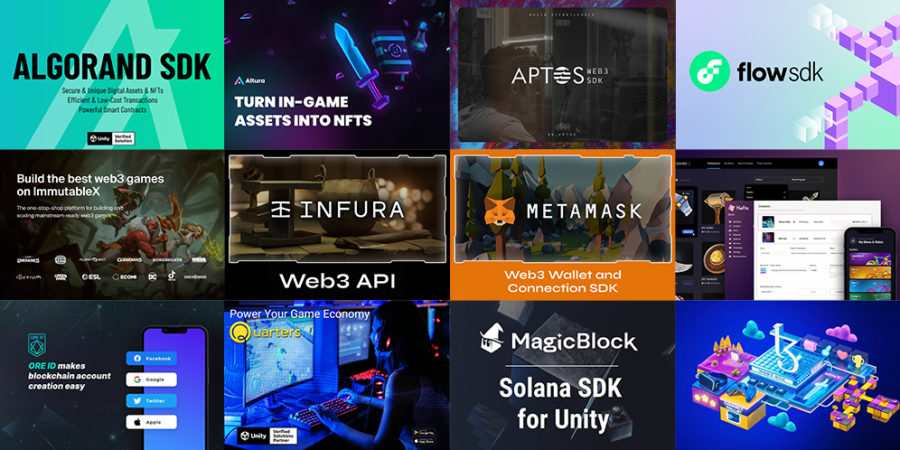
In General XR News
March 2, 2023 – Unity, a leading platform for creating and growing real-time 3D (RT3D) content, has this week introduced a new “Decentralization” category page in the Unity Asset Store with vetted solutions to support developers interested in technology that enables decentralization in gaming.
According to Unity, decentralization in this context typically refers to models of ownership in games that allow players to create, earn, or obtain in-game resources that they can then sell or trade. The new dedicated page on the Unity Asset Store will help interested developers find verified solutions to manage digital assets, set up smart contracts, build on blockchain networks, and more.
Decentralization represents a key piece of the metaverse puzzle, and is considered essential in order for the metaverse to achieve its full potential as a global, open, and inclusive virtual world. One of the main arguments for a decentralized metaverse is from the perspective of interoperability, and in that through the decentralization of digital assets, avatars, wallets, and more, it will allow users to seamlessly move between different platforms, creating a more cohesive metaverse experience.
As well as interoperability, decentralization represents the potential for increased independence across the metaverse, wherein no single entity or organization has complete control. It is also important for promoting innovation in that a decentralized metaverse would allow anyone to contribute to its development.
With a company such as Unity – one of the world’s leading platforms for cross-platform 3D content development – now offering content that is specifically catered towards decentralized assets, it marks a step in the right direction by a key player in the XR industry for laying the foundations of an open metaverse.
The 13 new verified solutions in the new “Decentralized” category are:
- AIKON ORE ID – AIKON’s ORE ID is a single sign-on platform that allows developers to create a Blockchain account upon first sign-in.
- Algorand – The Algorand SDK equips developers with tools to easily integrate digital assets and primitives into their games, while leveraging the Algorand blockchain.
- Altura – Altura’s API and SDKs allow developers to create, update, and transfer NFTs in-game.
- Aptos Labs – Aptos Labs created a software development kit that allows game developers to start building on Aptos.
- Dapper Labs – The Flow SDK for Unity allows Unity developers to integrate their games and applications with the Flow blockchain.
- Immutable X – A developer platform for building and scaling mainstream-ready web3 games on Ethereum.
- Infura (ConsenSys) – Infura’s infrastructure and suite of tools help developers build and connect to any EVM-compatible blockchain.
- Metamask (ConsenSys) – This SDK is a library that developers can install into their projects, which helps users connect easily with a MetaMask Wallet client for any game developed on Unity.
- Nefta – This SDK gives developers access to seamless integration of digital assets, multi-chain wallets, tokens, custom marketplaces, white label services and more.
- Pocketful of Quarters – The Quarters SDK is a plug and play monetization tool for developers that allows them to focus on creating social and interoperable games.
- Solana – The Solana SDK for Unity lets game developers easily integrate Solana-based NFTs, tokens, and on-chain programs within their Unity games.
- Tezos – The Tezos SDK comes with a wide range of features including linking player accounts across games, minting and trading of in-game items and currencies, and more.
- Truffle (ConsenSys) – Truffle is a comprehensive smart contract development framework for Ethereum.
To learn more about each solution visit the Unity Asset Store.
Image credit: Unity
About the author
Sam is the Founder and Managing Editor of Auganix. With a background in research and report writing, he has been covering XR industry news for the past seven years.




